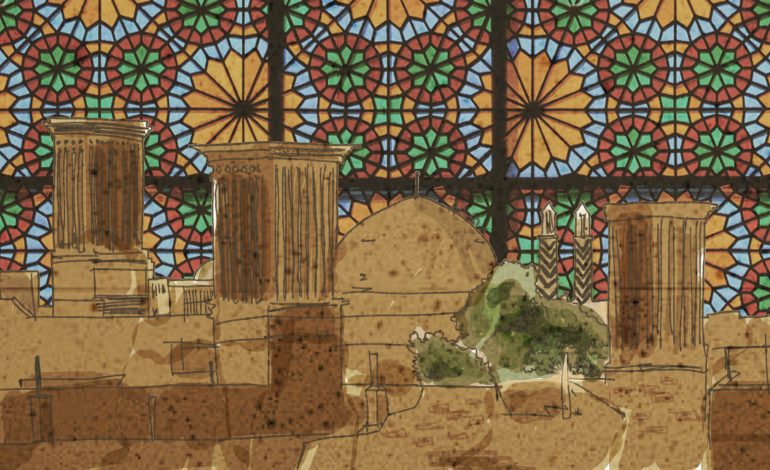Why Make Films That Don’t Make an Impact? Chat with SPM Makers

 Amid the cringe-inducing local films, a gem will hit the theater on June 19, a mood piece called Selamat Pagi, Malam (In the Absence of the Sun).
Amid the cringe-inducing local films, a gem will hit the theater on June 19, a mood piece called Selamat Pagi, Malam (In the Absence of the Sun).
Set in Jakarta at night, the story follows a lesbian couple, a social climber and a widow who feels her dedication to her husband has gone to waste when she finds out he’d been cheating on her. The three parallel stories intertwine seamlessly, creating a quite powerful storyline about star-crossed lovers, gender and social class.
Magdalene recently sat with the duo behind the film, writer/director Lucky Kuswandi and producer Sammaria Simanjuntak. Both in early 30s, they each have a couple of movies under their belts.
Lucky’s films have been screened in international films festivals, receiving accolades, awards and distribution. The Wall Street Journal calls his work “original and uncharted” and his short films are permanent collection at the Asian Film Archive. Selamat Pagi, Malam (SPM) is his second feature film after 2010’s Madame X, a fun and zany comedy about transgender people.
Sammaria is a filmmaker of her own right, with two feature films: 2009’s cin(T)a (God is a Director) – a touching love story of interfaith relationship – and 2013’s Demi Ucok (Finding Ucok), a hilarious and truthful quest of a mother who relentlessly tries to find a husband for her independent and strong willed daughter.
Below are excerpts of the interview.
Magdalene: So where did you get the idea for SPM?
Lucky (L): I studied in the United States (he received a BFA from the Art Center College of Design, Pasadena) and then returned in 2005. I went through exactly what Anggia faced. When I met my aunts, they didn’t ask about how I was doing and how my study was. Instead they asked why I gained weight, which for me, was offensive. And they asked about girlfriend and when I would get married.
And then Jakarta itself…even though the dining experience wasn’t as robust, but restaurants began to sell stuff like chicken soft roll, which turned out to be lumpia (spring roll). I recorded those things in my journal. I also went through an unresolved love story, so I incorporated all that in the story, plus the stories of my friends who also underwent reverse culture shock.
This movie should’ve been made in 2006, but there was no funding at that time, I hadn’t met the right producer. The film did not want to be made yet.
Sammaria (S): Lucky was not yet mature at that time.
L: If it were made in 2006, it would’ve been a bitch fest.
S: It’s still bitching, but wise bitch (laughs).
Which parts of the movie can you relate to, Sammaria?
S: Definitely the one about Anggia and Naomi. There’s no place for us here. The characters used to be a man and a woman, but when it was changed into a lesbian relationship, it became more powerful. I think Indri is Lucky. Lucky is Anggia from the outside, but when there’s food on the table, he would immediately take picture of it (laughs).
L: I am that shallow (laughs). Indri used to be a guy, but I thought it would be too cliché. Man meets another man on the street and then have sex. Whereas when the character is a woman, it becomes more powerful. She owns her own body, reclaims her sexuality. I decided to create a story about gender and class, so I present all women characters.

The part where Indri met the waiter, what was your idea to match them? What kind of impact do you want to achieve?
L: Indri (played by Ina Panggabean) comes from the lower-income bracket of the society, she wants to be Naomi, who marries well, eats at good restaurants.. When she meets David the rich guy, however, she realizes that she won’t find happiness. But when she meets Faisal (Trisa Triandesa), who can’t really give her anything, she is happy.
The characters know the city would not give them anything. They stand on their own. But they can be happy, unlike people like Anggia and Naomi. Maybe Indri and Faisal won’t find romance… it was only for the moment. But then again, many things in Jakarta are very temporary for me, especially at night. Suddenly the road turns into a race track at night. People create their own world, the temporary happiness is because the city doesn’t give them place for that. The morning comes and then they go back to the real world.
What about Cik Surya?
L: Cik Surya is like my mother, who dedicated her whole life for my father. And when he passed away, she no longer had any purpose in life. She’s OK now, but for years she went through constant wondering of who she was.
Jakarta becomes its own character. Is that one of the ideas?
L: Of course. For me the film is represented by Sofia, the lounge singer. That’s why the poster is like that. The city is a prostitute…
S: …with attitude.
L: Everyone prostitutes his/herself here, in one way or another. Whether for money, social status, artistic status.
Other characters are going through some sort of sexual liberation, but why isn’t there even a kissing scene between Anggia and Naomi? I mean, for a couple who’s in love and hasn’t met each other for a long time and longing for each other…
S: We went through a heated debate about that. I begged Lucky for just a kiss but he is very protective of his characters. He doesn’t want it to be too sexual. It’s all about a feeling. That was his choice, so as a producer, I followed him.
L: I was thinking more about Anggia’s character. Her old girlfriend is getting married with a man. Anggia wants to get back together but Naomi didn’t want to, so that’s it. Anggia wants to move on. I think if she was asked to have sex, she would’ve said no. Anggia is still clinging on to the past; to New York and Jakarta inside her head. So, she’d be ‘OK, I’m ready to face life now.’

Where did you get all the actors?
S, L: From casting, friends.
Adinia Wirasti (who plays Anggia) is so good. And so hot.
S: She’s a very good actress, one of the best in Indonesia. She learned scripwriting so it really helps the director.
L: Very much. So, my direction is not really a direction, but a discussion about character motivation, character arch, the progression. I came to Adinia and offered her the role. She was reluctant because she played a lesbian before and didn’t want to be typecast. But after she read the script, she immediately said yes.
Marissa Anita (Naomi) is also good because she has theater background. Actors who understand storytelling really help a lot.
Why did you finance the films yourself instead of looking for investor?
S: My previous films were funded by investors. But then I thought, if I hadn’t been too proud, I should’ve just borrowed from my mother and has the film rights. But I wanted to be independent and on my own, so I looked for other funding. I was in my 20s, so proud. Now, I have no shame (laughs). It’s not like I’m asking for free, I give it back to my parents.
How much did it cost to make your movies?
S: Both are over Rp 1 billion (about US$84,000). SPM costs a bit more, Rp 1.5 billion.
At the end of the day it’s not charity. Can you actually make money making movies?
S: Of course. Both my films broke even and made money. It doesn’t make sense if it doesn’t make money, because it’s business.
The main challenge for me in making movies is not cash, but your own conviction about your work. You have to treat it like any other products to sell. That’s what I felt for my previous two movies. Maybe Lucky is different, but that has been my experience. Once I was sure about the story, that it could be sold, that it was the one that I wanted to make…the money would come.
But can you make a living from making films?
L: So far I have to take side jobs to survive. I teach films because you cannot depend on film only. I don’t make movie twice a year or even once a year. It’s a big investment in terms of energy and money.
S: But it’s commercially viable. I left my previous job (as architect) that pays in dollar. Just do what you love. When the money is tight, then the lifestyle has to be adjusted.

This film is not like most commercial films, with unusual story arch. Did you think it would make money?
S: We never thought of creating films that don’t make money. It has to make money. The very definition of commercial is what’s the budget and what’s the market target. This kind of film, targeting certain market and with its own budget, I think it’s commercial.
L: I really want the film to be watched by as many people, particularly Jakartans, because it’s a movie about the city. But when I made this, I was never concerned whether it would be an art house film. I just have to tell the story truthfully. The style follows the story and the characters.. what are required by them.
As woman filmmaker, Samaria, is there any specific challenge that you face?
S: Because the industry does not even exist, amazingly there are many women directors and producers. So, there is no specific challenge for women. Anyone with the right mind and intention can go in.
Do you think Indonesian films already have social impact?
L: I think so. My documentary films until now are still screened by institutions, NGOs. My first feature, Madame X is a zany comedy (about transgender) but I’m still contacted by scholars who write about gender, LGBT. I hope it can make an impact. Otherwise why do we make films if they don’t many an impact? Even though it doesn’t have to be preachy.
Is distribution still a challenge?
L: Certainly. There are only two chains of cinemas, the number of screens are limited. It really depends on the first week. If a film doesn’t perform well in the first week, it would be taken out.
And then there is also an issue of quality. Many people are reluctant to watch Indonesian movies because of poor quality.
What’s lacking from Indonesian films?
L: I just got back from Cannes film festival, and according to people there, the main factors are the script and the acting. The script is too local; it doesn’t translate well to international audience, and the acting is histrionic and melodramatic.
Is it difficult to find good actors?
L: They are plenty, like Ina and Trisa. But it’s difficult for them to get a job and when they do most of them are supporting roles. People want actors with Eurasian face and younger ones even in theaters. It’s very physical.

Is film community supportive of each other?
L: It is increasingly more supportive, with a lot of associations established. I’m a member of the Indonesian Film Director Club (IFDC). We try to support each other. Like when I went to Cannes, I went as IFDC delegation, and I shared the experience and the contacts with the others. I met a lot of people, talked about how to improve Indonesian films. Like in France, they have the program where people only pay 20 Euros and they can watch as many French films as they can.
What about government support?
L: The plan to support is there (laughs). So now we think we just have to do the works ourselves. The Film Council, BPI, is an interesting institution. The members are our friends, not the government, but it doesn’t go against the government. Rather it embraces it while doing the work. It’s a fine balance.
How important is the role of government?
L: It’s very important, especially when it comes to tax, because film tax is very expensive.
S: If they don’t want to take care of us, at least please don’t burden us with regulations. It’s fine if it’s profitable, but when you haven’t made money yet..
L: Tax and also censorship. About 2 minutes of SPM are cut because it shows man’s bare butt and there’s the sound of people moaning for having sex. The censorship people don’t understand the context. Anything sexual must be out.
Samaria, you live in Bandung and you said you don’t feel at home in Jakarta.
S: Look at the city; only crazy people can consider it home. I never like this city. I live here only for work. But I don’t want to stay. If you’ve ever seen better cities, you won’t like it.
L: Jakarta is home, for now. Depending on who the next president is (laughs).






















